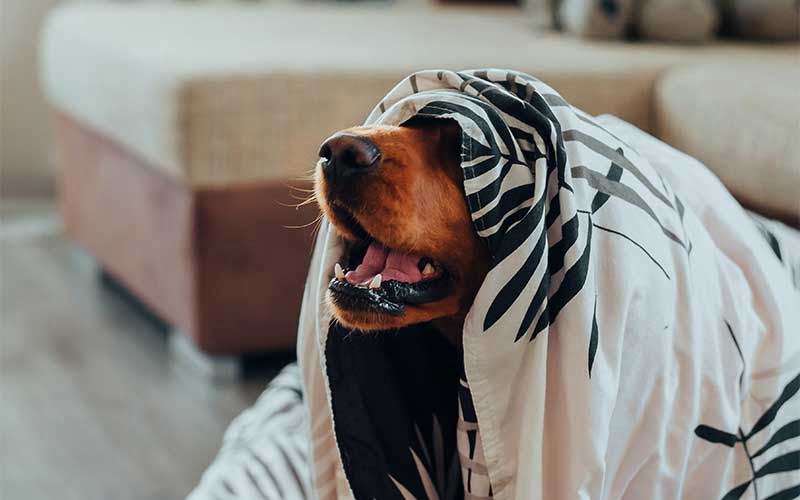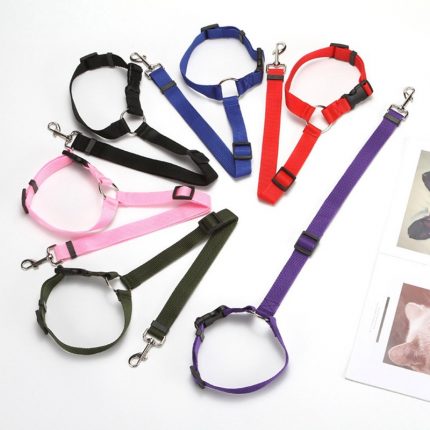Why is My Dog Groaning at Night?
Have you ever found yourself lying in bed, trying to fall asleep, only to be interrupted by the mysterious groaning sounds coming from your beloved furry friend? If so, you’re not alone. Many dog owners have experienced this puzzling behavior and wondered what it could possibly mean. In this article, we will explore the reasons behind why your dog may be groaning at night, shedding light on this intriguing phenomenon.
Dogs communicate with us in various ways, and vocalizations are one of their primary means of expression. While barking, whimpering, and growling are more commonly recognized forms of vocalization, groaning is a unique behavior that may leave dog owners perplexed. Understanding the potential causes behind your dog’s nighttime groaning can help you address any underlying issues and ensure the well-being of your furry companion.
One possible explanation for your dog’s groaning at night is discomfort or pain. Just like humans, dogs can experience physical discomfort that may intensify during periods of rest. Arthritis, joint inflammation, or even an upset stomach can contribute to your dog’s discomfort, leading to groaning as they try to find a more comfortable position. It is crucial to pay attention to any additional signs of distress, such as limping or decreased appetite, and consult with a veterinarian if necessary.

Another factor to consider is your dog’s age and breed. Older dogs, especially larger breeds, are more prone to age-related health issues that can cause discomfort. Conditions such as hip dysplasia or degenerative joint disease can lead to groaning as your dog tries to alleviate pain. Similarly, brachycephalic breeds, such as Bulldogs or Pugs, may groan due to their unique respiratory anatomy, which can make breathing more challenging, particularly during sleep.
Additionally, behavioral factors can contribute to your dog’s nighttime groaning. Dogs are highly perceptive animals, and changes in their environment or routine can cause anxiety or stress. If your dog is experiencing separation anxiety or is adjusting to a new living situation, they may exhibit groaning as a manifestation of their emotional state. Providing a calm and secure environment, along with positive reinforcement training, can help alleviate anxiety-related groaning.
In conclusion, there can be multiple reasons why your dog may be groaning at night. It is essential to observe your dog’s behavior, consider any potential underlying medical conditions, and evaluate their emotional well-being. By understanding the possible causes behind your dog’s groaning, you can take appropriate measures to address their needs and ensure a restful night’s sleep for both you and your furry companion.
Now, let’s move on to the main text and conclusion. If it’s clear, write back OK.
The Possible Reasons Behind Your Dog’s Nocturnal Groaning
1. Discomfort or Pain
One of the primary reasons why your dog may be groaning at night is discomfort or pain. Dogs, just like humans, can experience various physical ailments that can worsen when they are at rest. Conditions such as arthritis, joint inflammation, or an upset stomach can lead to discomfort, causing your dog to groan as they try to find a more comfortable position. It is crucial to pay attention to any additional signs of distress, such as limping or decreased appetite, and consult with a veterinarian if necessary.
2. Age and Breed
Age and breed can also play a significant role in your dog’s nighttime groaning. Older dogs, especially larger breeds, are more prone to age-related health issues that can cause discomfort. Conditions like hip dysplasia or degenerative joint disease can contribute to groaning as your dog tries to alleviate pain. Similarly, certain breeds with brachycephalic features, such as Bulldogs or Pugs, may groan due to their unique respiratory anatomy, which can make breathing more challenging, particularly during sleep.
3. Behavioral Factors
Behavioral factors can contribute to your dog’s nighttime groaning as well. Dogs are highly perceptive animals, and changes in their environment or routine can cause anxiety or stress. If your dog is experiencing separation anxiety or is adjusting to a new living situation, they may exhibit groaning as a manifestation of their emotional state. Providing a calm and secure environment, along with positive reinforcement training, can help alleviate anxiety-related groaning.
4. Attention-Seeking Behavior
Sometimes, dogs may groan at night as a way to seek attention or communicate their needs. If your dog has learned that groaning results in attention or rewards, they may continue this behavior to get your attention. It is essential to differentiate between genuine discomfort or pain and attention-seeking behavior. Ignoring attention-seeking groaning while ensuring your dog’s needs are met can help discourage this behavior.
5. Dreams and Sleep Patterns
Just like humans, dogs can dream during their sleep, and these dreams may lead to groaning or other vocalizations. It is normal for dogs to make noises during their sleep, especially during the REM (rapid eye movement) phase when dreams occur. If your dog’s groaning only happens during sleep and is not accompanied by any signs of distress or discomfort when awake, it is likely a natural part of their sleep patterns.

Conclusions
In conclusion, understanding why your dog is groaning at night is essential for ensuring their comfort and well-being. For more insights on this topic, visit geepets.com, where you’ll find a wealth of information on common dog behaviors, including night-time groaning, and practical tips on how to ensure a good night’s sleep for your furry friend.
Additionally, the American Kennel Club (AKC) website (akc.org) offers valuable resources and expert advice on dog health, training, and care to help you address any concerns related to your dog’s nighttime habits. Together, these resources can provide you with a comprehensive understanding of Why is My Dog Groaning at Night and how to effectively respond to your dog’s needs.
Practical Recommendations to Address Your Dog’s Nocturnal Groaning
1. Consult with a Veterinarian
If you notice persistent or concerning groaning from your dog at night, it is crucial to consult with a veterinarian. They can perform a thorough examination, assess any potential underlying medical conditions, and provide appropriate treatment or pain management strategies if necessary. A professional opinion will help ensure your dog’s well-being and provide peace of mind for you as a pet owner.
2. Provide Comfortable Sleeping Arrangements
Creating a comfortable sleeping environment for your dog can help alleviate any discomfort or pain that may be contributing to their groaning. If you’re asking yourself, “Why is my dog groaning at night?” consider providing a supportive dog bed with orthopedic features, especially for older dogs or those with joint issues. Additionally, ensure that the sleeping area is warm, quiet, and free from any potential distractions that may cause anxiety or restlessness.
The question “Why is my dog groaning at night?” often leads pet owners to overlook the importance of a proper sleeping setup. Addressing the root of “Why is my dog groaning at night?” can sometimes be as simple as enhancing their comfort during rest. This attention to their sleeping environment not only addresses the immediate concern of “Why is my dog groaning at night?” but also promotes overall health and well-being, potentially reducing the frequency of this behavior.
3. Regular Exercise and Weight Management
Regular exercise is essential for maintaining your dog’s overall health and can help reduce any discomfort or pain associated with conditions like arthritis, which might lead you to wonder, “Why is My Dog Groaning at Night?” Engaging your dog in daily physical activities such as walks, playtime, or interactive toys keeps their joints and muscles active, potentially addressing the underlying issues causing nighttime discomfort that leads to the question, “Why is My Dog Groaning at Night?” Additionally, maintaining a healthy weight through proper nutrition and portion control can alleviate strain on your dog’s joints and contribute to their overall well-being, which could be a significant factor if you’re concerned about “Why is My Dog Groaning at Night.”
Understanding the importance of these activities can provide insights into the question, “Why is My Dog Groaning at Night?” as a well-exercised and nutritionally balanced dog is less likely to experience the discomfort that might cause groaning. If you find yourself frequently asking, “Why is My Dog Groaning at Night?” consider evaluating your dog’s daily exercise routine and diet. It’s possible that enhancing these aspects of their care could reduce or eliminate the groaning, leading to a more peaceful night for both you and your dog.
4. Consider Dietary Adjustments
In some cases, dietary changes can help alleviate digestive issues that may cause discomfort and lead to groaning. If you’re wondering, “Why is my dog groaning at night?” it could be a sign that their diet needs adjustment. Consult with your veterinarian to determine if a specialized diet or specific dietary adjustments could benefit your dog, especially if the question “Why is my dog groaning at night?” is becoming more frequent.
They can recommend appropriate food options that promote digestive health and reduce the likelihood of gastrointestinal discomfort, potentially addressing the concern behind “Why is my dog groaning at night?” Making these changes can be crucial in ensuring your dog’s comfort and well-being, and may help diminish the occurrences of nighttime groaning, thus providing an answer to the troubling question, “Why is my dog groaning at night?”
5. Implement Positive Reinforcement Training

6. Minimize Environmental Stressors
Reducing environmental stressors can help alleviate anxiety-related groaning, a common concern for pet owners who find themselves asking, “Why is My Dog Groaning at Night?” Creating a calm and secure environment for your dog is paramount in addressing the question, “Why is My Dog Groaning at Night?” By minimizing loud noises, providing a designated safe space, and maintaining a consistent daily routine, you can significantly reduce the instances of your dog groaning at night.
Our featured products:
For those pondering over “Why is My Dog Groaning at Night,” consider the use of calming aids such as pheromone diffusers or soothing music specifically designed for dogs. These aids can be particularly effective in promoting relaxation during sleep, thereby offering a solution to the problem of “Why is My Dog Groaning at Night.” Implementing these strategies not only addresses the immediate concern of “Why is My Dog Groaning at Night” but also contributes to the overall well-being and comfort of your dog, ensuring they have a peaceful and restful night’s sleep.
7. Regular Veterinary Check-ups
Routine veterinary check-ups are essential to monitor your dog’s overall health and address any potential issues before they escalate. Regular examinations, vaccinations, and preventive care can help identify and manage any underlying conditions that may contribute to your dog’s groaning at night.
Remember, every dog is unique, and the causes of groaning can vary. It is crucial to tailor these recommendations to your specific dog’s needs and consult with a veterinarian for personalized advice. By implementing these practical recommendations, you can help address your dog’s nocturnal groaning and ensure their comfort and well-being during sleep.















